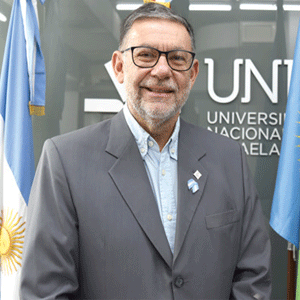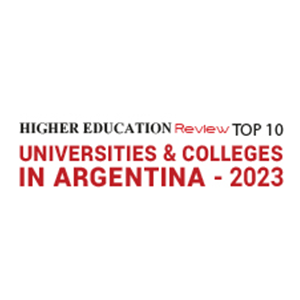Universidad Nacional De Rafaela: Nurturing Innovation & Growth In Higher Education
By Dr. Ruben Ascua, Rector
The Universidad Nacional de Rafaela (UNRAF) is a public university located in Rafaela, Argentina. It is one of the growing numbers of universities in Argentina that have filled the areas where there were no higher education institutions before, making it possible for thousands of people to access higher education. The university focuses not only on academic progress but also on students’ health and multicultural skills. UNRAF is preparing students for the industry with the uniqueness of its higher education courses, the quality of its faculty members, its modern-day infrastructure, scholarship opportunities, and its industry-academia partnerships.
“Preparing students for the industry is a significant challenge for higher education institutes in Argentina, but UNRAF is addressing this issue. The university maintains links with many companies in Rafaela and the region to provide opportunities for professional practices, internships, research and development scholarships”, says Prof. Dr. Ruben Ascua, Rector. UNRAF Tec, an applied research center consisting of nine laboratories, focuses on key issues for industrial development, such as digital transformation, information management, industrial design, circular economy, energy efficiency, and environmental technologies.
In addition, research and technological services are developed in laboratories for the food industry, video games, and digital media. All these areas allow students to interact with the productive network, enriching their training experience and developing new skills.
UNRAF offers innovative courses that focus not only on academic progress but also on the students health and multicultural skills. The university offers a sports program, internships in local companies, mental health assistance, and volunteer programs. UNRAF considers that all these experiences will help students develop intercultural
competence to become citizens of the world, to respect others and their opinions, to repudiate racism and inequality, to become real professionals, and great human beings.
Being a young university, UNRAF is in a phase of strong expansion and consolidation of an innovationoriented academic offer. The teaching staff follows this trend, increasing its number year by year. Being a public university, there is a process of public competitions to cover positions and thus guarantee excellence in educational quality. In addition, the university provides financial support to its teachers to develop postgraduate studies, as well as training courses and workshops according to the needs identified.
The university is in the midst of developing its university campus, a 10-hectare site where all university life is expected to be concentrated. The first two buildings were recently inaugurated, one with laboratories for teaching and research and the other with classrooms and common spaces required for academic activities.
Two other buildings are under construction, and the complete plan foresees seven buildings distributed in a landscaped design that integrates it with the landscape and biodiversity of the area. In addition, the University, through a university welfare area, has sports, cultural, and student support programs that allow students to develop a full experience.
Although higher education is primarily free in Argentina, study material, transportation, and lodgings are not. Thus, scholarships play an important role in helping students focus on their studies, especially students with lower income. UNRAF offers its students scholarships to have temporary jobs, study foreign languages, access to educational material, even to do sport.
The Universidad Nacional de Rafaela (UNRAF), a public university in Argentina, has made it a priority to establish partnerships with organizations in the socio-productive network to align its pedagogy with the requirements of the industry. The teaching staff, comprised of experienced professionals currently working in key companies and institutions in the territory,
further enhances the dialogue between pedagogical decisions and industry needs.
UNRAF plans to expand its academic offerings, especially in its distance education segment, after achieving success with its first graduates. The university is committed to offering innovative postgraduate proposals with strong support in technology. UNRAF is also investing in the development of its infrastructure to provide a rich campus life experience.
UNRAF is implementing new procedures to support the careers of teachers, enhance their teaching, research, and articulation tasks, and guarantee its educational proposal. The university's trajectory in a short time is evident by the expansion of its campus, which now has three faculties, 20 careers, and 17 diploma courses. Currently, UNRAF has more than 3600 students, 200 graduates, and 400 teachers.
UNRAF's commitment to building industryacademia partnerships and expanding its academic offerings is setting the pace for quality education. Its focus on supporting teachers and developing its infrastructure ensures that students receive an enriching campus experience. The Universidad Nacional de Rafaela is poised to continue its growth and expansion in the years to come.
Prof. Dr. Ruben Ascua is the Rector of the National University of Rafaela (Period 2017-25) and professor at the National Technological University (UTN) in Rafaela and guest lecturer at the Faculty of Economics of the University of Applied Sciences of Kaiserslautern, Germany. Former president of Red Pymes Mercosur, the International Council for Small Business (ICSB) and Empretec Foundation, Argentina.
Prof. Dr. Ruben Ascua has obtained two undergraduate degrees: National Public Accountant (UNL-FCE) and Bachelor in Economics (UNR-FCEyE) in Argentina; and a Master and PhD in Economics (PWU San Diego, USA). He has worked as an external consultant for CEPAL, BIDY CFI. His fields of research and teaching are: SME and start-up development; theory of the firm; markets and financing instruments for SMEs; formulation and evaluation of industrial investment projects; clusters and industrial districts.
“Preparing students for the industry is a significant challenge for higher education institutes in Argentina, but UNRAF is addressing this issue. The university maintains links with many companies in Rafaela and the region to provide opportunities for professional practices, internships, research and development scholarships”, says Prof. Dr. Ruben Ascua, Rector. UNRAF Tec, an applied research center consisting of nine laboratories, focuses on key issues for industrial development, such as digital transformation, information management, industrial design, circular economy, energy efficiency, and environmental technologies.
In addition, research and technological services are developed in laboratories for the food industry, video games, and digital media. All these areas allow students to interact with the productive network, enriching their training experience and developing new skills.
Uniqueness of Higher Education Courses
UNRAF offers innovative courses that focus not only on academic progress but also on the students health and multicultural skills. The university offers a sports program, internships in local companies, mental health assistance, and volunteer programs. UNRAF considers that all these experiences will help students develop intercultural
competence to become citizens of the world, to respect others and their opinions, to repudiate racism and inequality, to become real professionals, and great human beings.
Being a young university, UNRAF is in a phase of strong expansion and consolidation of an innovationoriented academic offer. The teaching staff follows this trend, increasing its number year by year. Being a public university, there is a process of public competitions to cover positions and thus guarantee excellence in educational quality. In addition, the university provides financial support to its teachers to develop postgraduate studies, as well as training courses and workshops according to the needs identified.
"UNRAF is implementing new procedures to support the careers of teachers, enhance their teaching, research, & articulation tasks, & guarantee its educational proposal"
Modern-day infrastructure
The university is in the midst of developing its university campus, a 10-hectare site where all university life is expected to be concentrated. The first two buildings were recently inaugurated, one with laboratories for teaching and research and the other with classrooms and common spaces required for academic activities.
Two other buildings are under construction, and the complete plan foresees seven buildings distributed in a landscaped design that integrates it with the landscape and biodiversity of the area. In addition, the University, through a university welfare area, has sports, cultural, and student support programs that allow students to develop a full experience.
Although higher education is primarily free in Argentina, study material, transportation, and lodgings are not. Thus, scholarships play an important role in helping students focus on their studies, especially students with lower income. UNRAF offers its students scholarships to have temporary jobs, study foreign languages, access to educational material, even to do sport.
The Universidad Nacional de Rafaela (UNRAF), a public university in Argentina, has made it a priority to establish partnerships with organizations in the socio-productive network to align its pedagogy with the requirements of the industry. The teaching staff, comprised of experienced professionals currently working in key companies and institutions in the territory,
further enhances the dialogue between pedagogical decisions and industry needs.
Expanding Academic Offerings & Enhancing Infrastructure
UNRAF plans to expand its academic offerings, especially in its distance education segment, after achieving success with its first graduates. The university is committed to offering innovative postgraduate proposals with strong support in technology. UNRAF is also investing in the development of its infrastructure to provide a rich campus life experience.
UNRAF is implementing new procedures to support the careers of teachers, enhance their teaching, research, and articulation tasks, and guarantee its educational proposal. The university's trajectory in a short time is evident by the expansion of its campus, which now has three faculties, 20 careers, and 17 diploma courses. Currently, UNRAF has more than 3600 students, 200 graduates, and 400 teachers.
UNRAF's commitment to building industryacademia partnerships and expanding its academic offerings is setting the pace for quality education. Its focus on supporting teachers and developing its infrastructure ensures that students receive an enriching campus experience. The Universidad Nacional de Rafaela is poised to continue its growth and expansion in the years to come.
Dr. Ruben Ascua, Rector, Universidad Nacional De Rafaela
Prof. Dr. Ruben Ascua is the Rector of the National University of Rafaela (Period 2017-25) and professor at the National Technological University (UTN) in Rafaela and guest lecturer at the Faculty of Economics of the University of Applied Sciences of Kaiserslautern, Germany. Former president of Red Pymes Mercosur, the International Council for Small Business (ICSB) and Empretec Foundation, Argentina.
Prof. Dr. Ruben Ascua has obtained two undergraduate degrees: National Public Accountant (UNL-FCE) and Bachelor in Economics (UNR-FCEyE) in Argentina; and a Master and PhD in Economics (PWU San Diego, USA). He has worked as an external consultant for CEPAL, BIDY CFI. His fields of research and teaching are: SME and start-up development; theory of the firm; markets and financing instruments for SMEs; formulation and evaluation of industrial investment projects; clusters and industrial districts.



